A superior court trial that is expected to test the broad powers of the Martha’s Vineyard Commission to control development on the Island got underway early this week in the Edgartown courthouse.
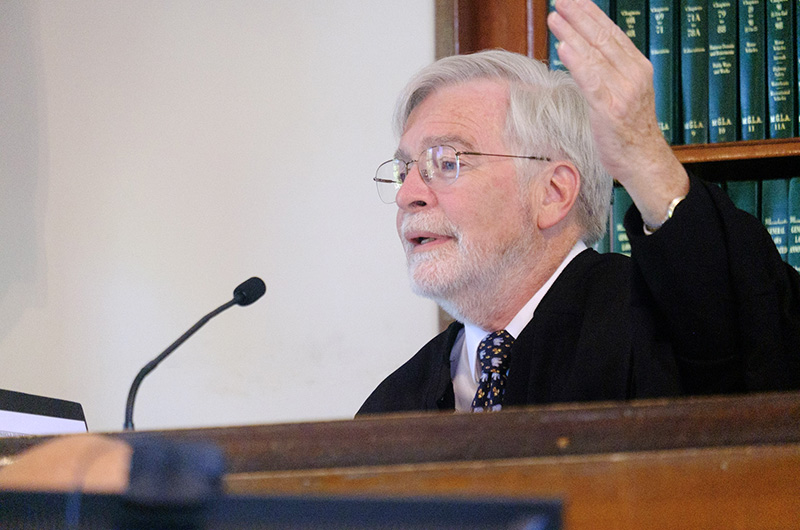
Douglas K. Anderson and Richard G. Matthews, two developers based in Salt Lake City, Utah, are appealing the commission’s 2020 denial of their plan to develop a subdivision called Meeting House Way, on 54 acres in the outskirts of Edgartown.
“We are all environmentalists here. We all want to protect Martha’s Vineyard,” said Edward (Terry) Dangel, the lawyer representing the developers, in opening statements Tuesday. “But the institutions that are supposed to protect us must function fairly, in accordance with the law.”
“The plaintiff . . . claims that the commission should have fixed its concededly flawed proposal,” countered Johanna Schneider, attorney for the commission, in her opening statement. “That position has no support in any case involving the commission.”
The Hon. Paul D. Wilson, an associate justice of the superior court who has extensive experience in in land-use law, is presiding over the trial, which is expected to run through early next week. Both parties have agreed to have the judge hear the case without jury.
On Tuesday opening arguments revealed two different views of the regional land use commission, created by an act of the state legislature nearly 50 years ago. Mr. Dangel painted a picture of an agency that issues arbitrary decisions based on the whims of commissioners, sometimes in conflict with its own guidelines. The result is an elected body which has strayed too far from its mission, he said.
“They’ve been in existence for 48 years and for 48 years they’ve been unwilling to tell people, this is how big your house can be,” Mr. Dangel said. “They keep it close to the vest.”
Ms. Schneider highlighted the commission’s unique mission as a state-chartered planning agency. “We are honored to represent the Martha’s Vineyard Commission, which is a creature unique in state law,” she said. She described the MVC’s role in weighing the benefits and detriments of developments it reviews. In order to accomplish that goal it needs wide latitude to interpret projects, which is exactly what it did with Meeting House, she said.
“The commission’s very reason for being is that the legislature determined that market demand for development did not adequately protect the unique and natural environment of the Island,” Ms. Schneider said. “The court owes substantial deference to the commission.”
Mr. Dangel too zeroed in on the benefits and detriments issue. When Mr. Anderson and Mr. Matthews initially presented their plan, it called for 36 market rate homes. The final plan was changed to 28 market rate homes plus a cluster of 14 town homes priced below market rate. The commission denied the project, despite the developers changing everything from the number of units to the landscaping plan to satisfy commissioners, he said.
“We’re going to ask you to say it’s more of a benefit than a detriment,” he told the judge. Ms. Schneider said the development was too big for the area, repeatedly calling it out of scale. And while the idea of the affordable townhouses was laudable, she said it fell short of affordable housing standards Islandwide.
“That the commission would consider these facts was a surprise to precisely nobody,” Ms. Schneider said.
After opening statements, the judge, the superior court clerk and a gaggle of attorneys on both sides drove to the development for a view, on a sun-dappled day.
“That was the longest and perhaps prettiest view I’ve ever taken as a lawyer or judge,” Judge Wilson said when the court session resumed Wednesday morning.
The first days of the trial saw Mr. Dangel call a flurry of witnesses. They included environmental and housing experts who testified to specific aspects of the plan. On Wednesday morning Doug Hoehn, an Vineyard-based civil engineer who worked for the developers, spoke about how the plan changed over time based on feedback from the commissioners.
“We were trying to add as many benefits to the project as we could,” Mr. Hoehn said. Other witnesses included John Larsen, an Edgartown attorney and title examiner, Steven Vetere, an environmental engineer and wastewater expert, and Mark Hess, chairman of the Edgartown affordable housing committee.
On Thursday the trial moved from the light-filled courtroom on the top floor to the secondary courtroom in the basement, a cramped space with white tile floors and windows peering up to the street to accommodate a district court proceeding.
James Joyce, a former commissioner who is an Island real estate agent, testified on the subject of Island character — a key theme in the case.
“There’s a variety of Island character here, there’s no one character,” Mr. Joyce said. “The Island has changed, the world has changed, and people are afraid of that.”
Also Thursday MVC executive director Adam Turner took the stand for nearly two hours. Recounting the commission’s decision on the project, Mr. Dangel repeatedly asked the executive director to give insights into the reasoning. But Mr. Turner was noncommittal, saying he was uncomfortable speaking for commissioners.
“The commission spoke and this is what they said,” the executive director said. “There’s 17 of them, I hesitate to offer my opinion of what they felt. I don’t know.”
He repeatedly directed Mr. Dangel to the written decision in response to questioning.
“The commission was in favor of the 14 [town]houses, correct?” Mr. Dangel asked.
“I think it speaks for itself,” Mr. Turner responded, referring to the decision.
Mr. Turner did agree that he had played a role in suggesting the townhouses, as the plan went through various revisions. Sensing the plan was not being received favorably, the applicants approached Mr. Turner to see what benefits they could add, he said. Mr. Turner suggested affordable units considering the Island’s housing needs.
“I didn’t like it or not like it. It had some merit but needed to be worked out more,” Mr. Turner said. “I cautioned them that . . . they needed to fully scope this out before they presented it to the commission.”
MVC attorneys did not cross examine Mr. Turner. But Ms. Schneider indicated she may call Mr. Turner as a witness when the commission presents its case next week.
The developers for the project were present in the courtroom throughout the week. Commission representatives — including staff and commissioners — came in and out at various points.
Judge Wilson has traveled to the Island from Boston to hear the case, which is the first major legal challenge to the commission statute in decades. At one point during the proceeding Thursday, the judge interjected to remind Mr. Dangel of his own role in the case.
“My job is to find the facts anew and make a decision on whether it was arbitrary and capricious,” Judge Wilson said. “I don’t care what commissioners said unless it leads to the conclusion that they were trying to keep off-Islanders off Island.”
Earlier in the week Judge Wilson also made a brief disclosure: he previously worked at a law firm which handled a case involving Herring Creek farm more than 20 years ago, he said. Judge Wilson was not involved in the case, but asked attorneys on each side if they thought it brought up a conflict of interest. Neither had a problem.
“I see no reason why I could not be fair,” Judge Wilson said.
Ms. Schneider is joined by co-counsel Pat Moore; both are partners at Hemenway & Barnes in Boston. Mr. Dangel is an Edgartown-based attorney who practices on the Island and in Boston.
The trial resumes Friday morning. Patrick Ahearn, an Edgartown architect, is expected to take the stand as a witness for the plaintiffs.

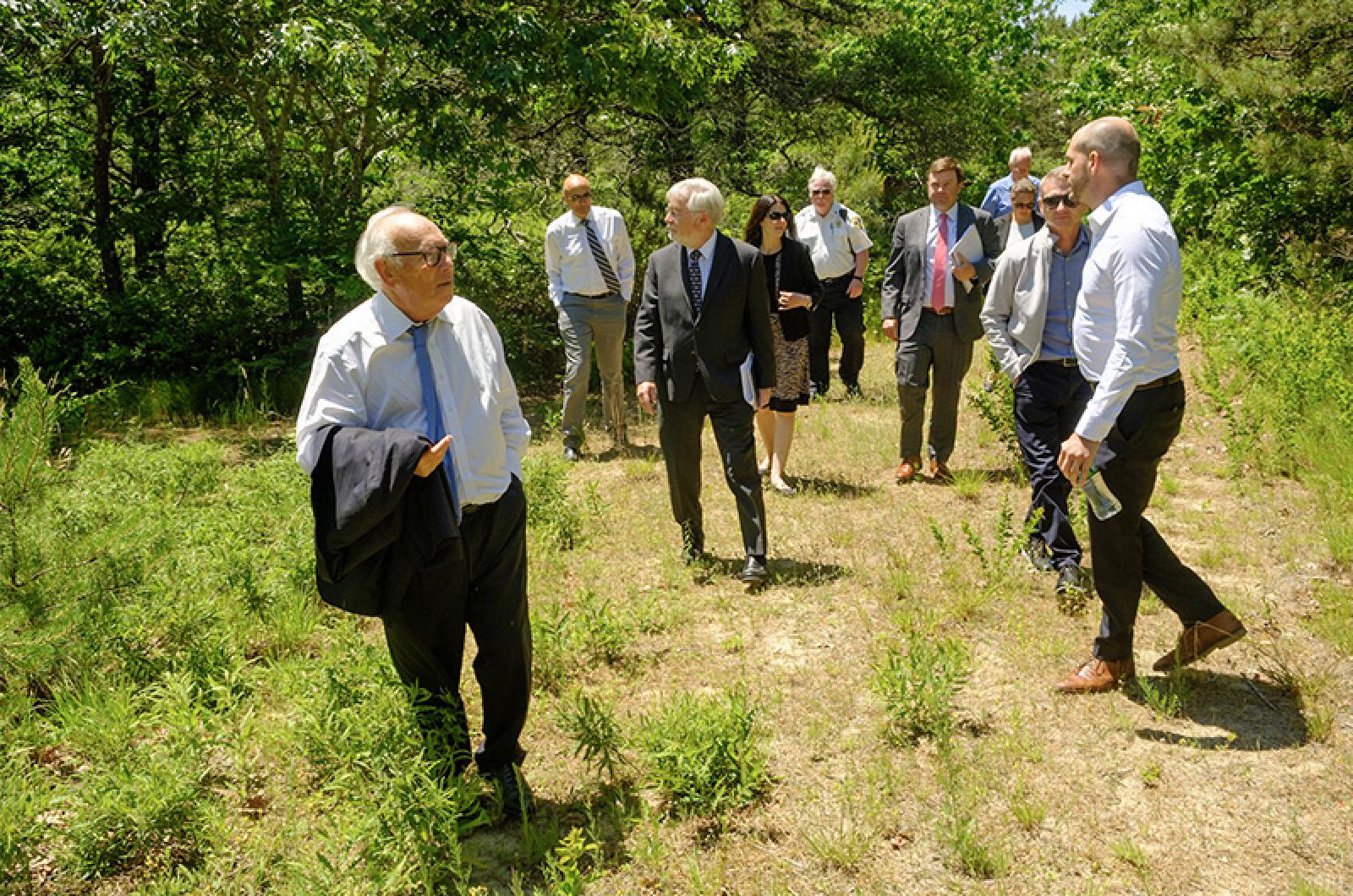
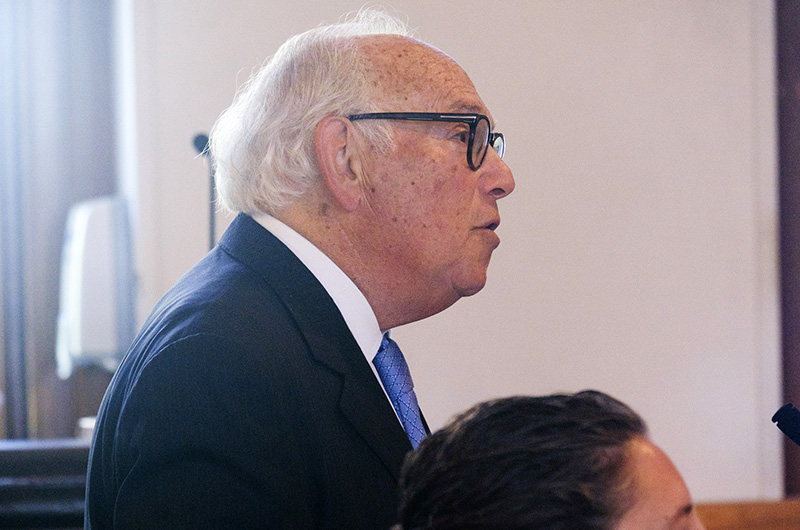
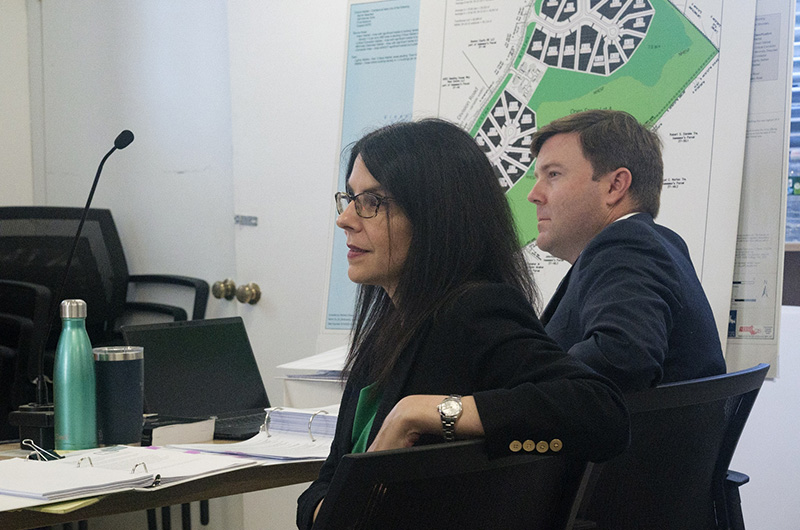
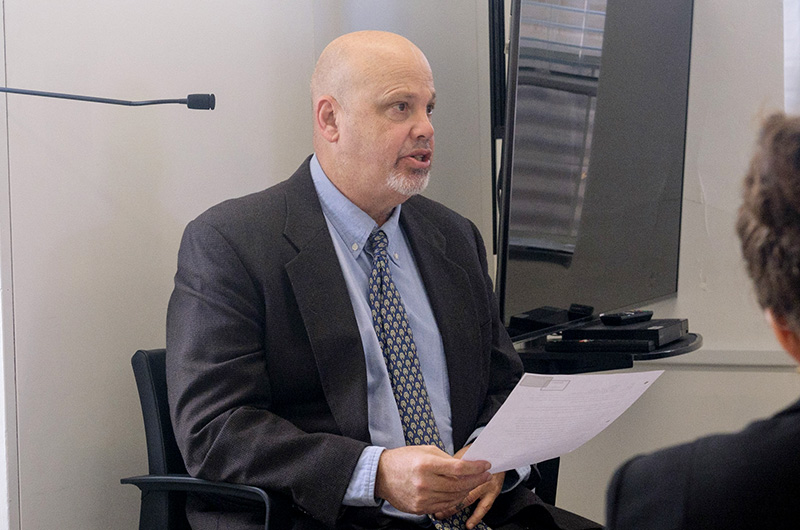





Comments (23)
Comments
Comment policy »